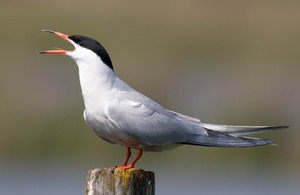Birds of a feather - restoring habitats for seabirds
Natural England launches innovative habitat restoration project by creating safe spaces for seabirds within the Solent.

The common tern - image credited to Adam Wells
Natural England is pleased to announce the successful launch of a pioneering habitat restoration project aimed at supporting breeding seabirds in the Solent. The initiative, part of the broader Solent Seascape Project, focuses on creating vital nesting habitats for terns and other seabirds.
The project aims to provide suitable nesting sites for four species of terns - common, sandwich, little, and roseate - and other breeding seabirds. Initial trials with a single shingle-topped raft in April 2024 proved successful, attracting the first common terns to successfully breed on the national nature reserve for over 20 years. The new shingle islands are expected to benefit both breeding seabirds in spring and summer, and overwintering wading birds.
Jessica Taylor, a marine and coastal senior officer at Natural England, said:
“This project represents a significant step in our efforts to support the recovery of seabird populations in the Solent. By creating these protected nesting sites, we’re addressing the decline in suitable natural shingle habitats caused by factors such as sea level rise and increasing tidal surges.”
The North Solent national nature reserve, one of Natural England’s largest, provides a crucial sanctuary for a diverse range of bird species. The new shingle islands, located behind a sea wall in a restricted access area, offer protection from rising sea-levels and human disturbance.
This initiative is part of the larger Solent Seascape Project, a five-year, multi-partner endeavour. East Head Impact and the Endangered Landscapes & Seascapes Programme (ELSP), managed by the Cambridge Conservation Initiative and funded by Arcadia, support the Solent Seascape Project. The project aims to restore four vulnerable marine habitats across the Solent region by 2027.
Louise MacCallum, Solent project manager at Blue Marine Foundation, the lead partner on the project, said:
“It is so exciting to see these new islands take shape at North Solent NNR after so many months of planning. They will form a crucial part of the network of restored seabird sites we are creating as part of the Solent Seascape Project across the entire Solent region.”
Natural England will continue to monitor the use of these new habitats throughout the year, with the potential to create additional nesting islands if the project proves successful.
For more information about the Solent Seascape Project visit: Home - Solent Seascape.
Background:
- Natural England is the government’s adviser for the natural environment in England, helping to protect England’s nature and landscapes for people to enjoy and for the services they provide.
- The Solent and Southampton Water Special Protection Area is a designated site of international importance for bird conservation.
- Shingle is a beach deposit consisting of rounded pebbles and cobbles, mixed with coarser pebbles, sand, and marine shells.
- Terns are seabirds in the family Laridae that have a worldwide distribution and are normally found near the sea, rivers, or wetlands.
- The Solent Seascape Project is a five-year, multi-million-pound partnership project which is restoring seagrass, saltmarsh, oysters and seabird nesting habitat to the Solent, in collaboration with the local community. Project partners include Blue Marine Foundation, RSPB, Hampshire and Isle of Wight Wildlife Trust, Project Seagrass, Natural England, the Environment Agency, Coastal Partners, Isle of Wight Estuaries Project, Chichester Harbour Protection and Recovery of Nature and the University of Portsmouth.
Contact us:
Journalists only - Natural England and Environment Agency press office: 0800 141 2743 or [email protected].